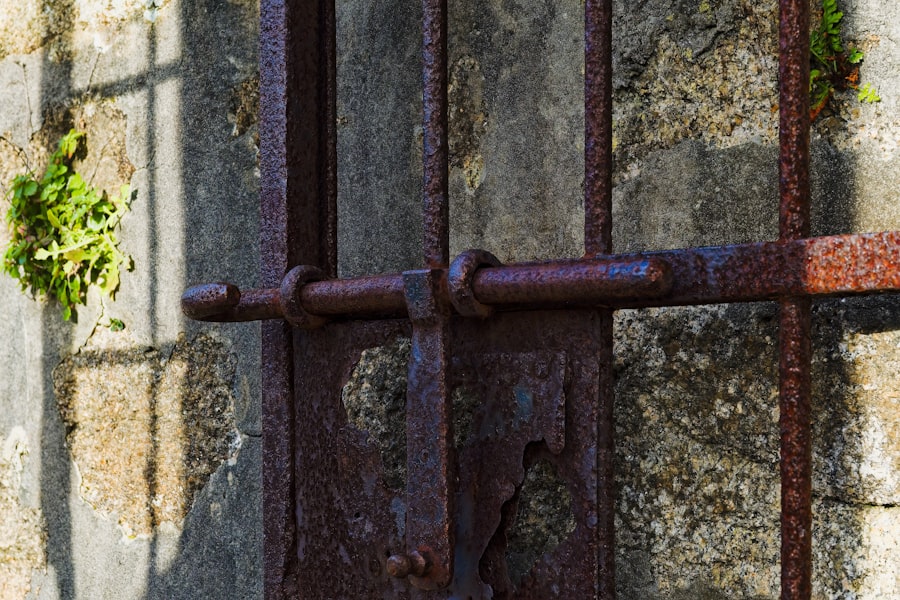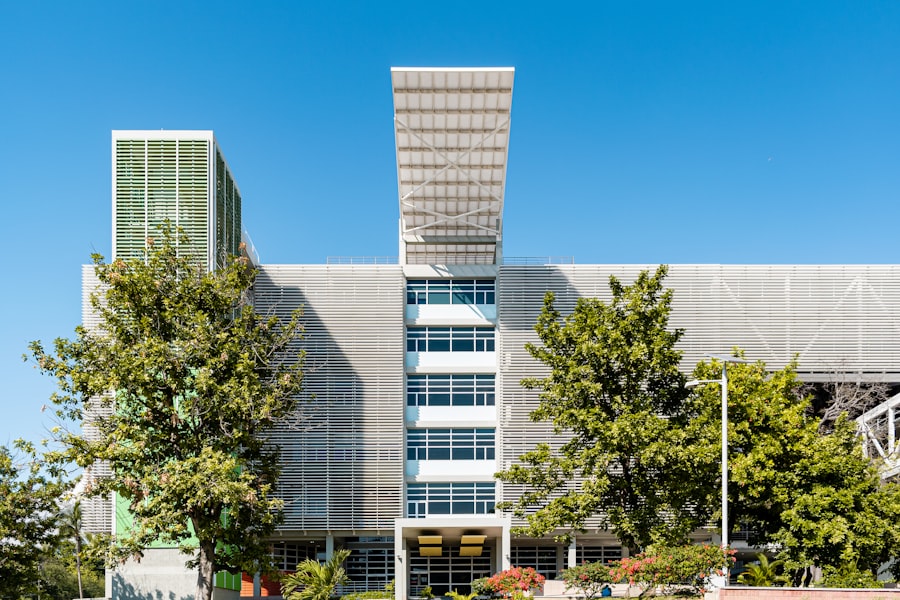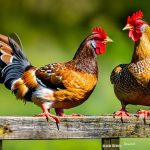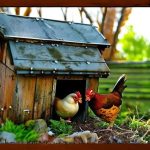Chickens are highly susceptible to heat stress, which can significantly impact their health and productivity. When temperatures rise, chickens struggle to regulate their body temperature, leading to various negative effects. Heat stress can cause decreased feed intake, reduced egg production, poor egg quality, and even mortality in severe cases.
Additionally, heat stress can compromise the immune system of chickens, making them more susceptible to diseases and infections. It is essential for poultry farmers to understand the impact of heat on their chickens to implement effective mitigation strategies. Heat stress occurs when the environmental temperature exceeds the chicken’s comfort zone, typically between 65-75 degrees Fahrenheit (18-24 degrees Celsius).
When temperatures rise above this range, chickens experience physiological stress as they attempt to dissipate excess body heat. This can lead to panting, increased water consumption, reduced activity, and in severe cases, death. Poultry farmers must be aware of the signs of heat stress in chickens to take appropriate action and prevent negative consequences.
Understanding the impact of heat on chickens allows farmers to make informed decisions about how to best care for their flock during periods of hot weather.
Table of Contents
Key Takeaways
- Heat stress can have a significant impact on chickens, affecting their health and productivity.
- Providing adequate shade and shelter is crucial to protect chickens from the harmful effects of heat.
- Ensuring access to cool, fresh water is essential for keeping chickens hydrated and regulating their body temperature.
- Utilizing cooling methods such as misters or fans can help lower the temperature in chicken coops and reduce heat stress.
- Adjusting feeding schedules and types of feed can help chickens cope with high temperatures and maintain their nutritional needs.
Providing adequate shade and shelter
Reducing Environmental Temperature
One of the most important strategies for mitigating the impact of heat on chickens is to provide adequate shade and shelter. This can help to reduce the environmental temperature and protect chickens from direct sunlight, which can significantly contribute to heat stress. Natural shade from trees or man-made structures such as awnings or shelters can provide relief from the sun’s rays and help to create a more comfortable environment for chickens.
Promoting Air Circulation
Additionally, proper ventilation in chicken coops and housing can help to promote air circulation and reduce the buildup of heat. In addition to providing shade, it’s important for poultry farmers to ensure that their chickens have access to shelter that protects them from extreme weather conditions. This can include protection from wind, rain, and other environmental factors that can exacerbate the effects of heat stress.
Creating a Comfortable and Safe Environment
By providing adequate shade and shelter, poultry farmers can help to create a more comfortable and safe environment for their chickens, reducing the risk of heat-related health issues and promoting overall well-being.
Ensuring access to cool, fresh water

Access to cool, fresh water is essential for chickens during periods of hot weather. Water plays a critical role in helping chickens regulate their body temperature and stay hydrated, which is especially important when temperatures are high. Poultry farmers should ensure that their chickens have access to clean water at all times, and take steps to keep the water cool to help lower the birds’ body temperature.
In hot weather, water consumption by chickens can increase significantly as they attempt to cool themselves through panting and increased drinking. It’s important for poultry farmers to monitor water consumption and refill waterers frequently to ensure that chickens have an adequate supply of water. Additionally, providing water in shaded areas can help to keep it cooler for longer periods of time.
By ensuring access to cool, fresh water, poultry farmers can help their chickens stay hydrated and reduce the risk of heat stress.
Utilizing cooling methods such as misters or fans
In addition to providing shade and shelter, poultry farmers can utilize cooling methods such as misters or fans to help lower the environmental temperature for their chickens. Misters can be used to create a fine spray of water that helps to cool the air and reduce the heat stress experienced by chickens. Similarly, fans can help to promote air circulation and create a more comfortable environment for chickens by reducing the buildup of heat.
Misters and fans can be strategically placed in chicken coops or outdoor areas where chickens spend time to provide relief from hot weather. These cooling methods can be especially effective during periods of extreme heat when natural shade and ventilation may not be sufficient to keep chickens comfortable. By utilizing misters or fans, poultry farmers can help to create a more favorable environment for their chickens and reduce the risk of heat-related health issues.
Adjusting feeding schedules and types of feed
During periods of hot weather, it may be necessary for poultry farmers to adjust feeding schedules and types of feed to help reduce the impact of heat on their chickens. High-protein feeds can increase metabolic heat production in chickens, which can exacerbate the effects of heat stress. By adjusting the type of feed provided to chickens during hot weather, poultry farmers can help to reduce the metabolic heat produced by the birds’ digestive processes.
Additionally, adjusting feeding schedules can help to encourage chickens to eat during cooler parts of the day when temperatures are lower. This can help to reduce the metabolic heat produced by digestion and promote better feed intake by chickens. By making these adjustments, poultry farmers can help to minimize the impact of heat on their chickens and promote better overall health and productivity.
Monitoring signs of heat stress and taking action

Heat stress is a critical issue that poultry farmers need to monitor closely in their chickens. Timely intervention is essential to prevent severe health consequences.
Recognizing the Signs of Heat Stress
Chickens exhibit distinct signs when they are experiencing heat stress. These include panting, reduced activity, increased water consumption, and decreased feed intake. In addition, they may display signs of distress, such as wing spreading or seeking out cooler areas, in an attempt to regulate their body temperature.
Taking Prompt Action
When signs of heat stress are observed, poultry farmers should take immediate action to help their chickens cool down and reduce the risk of negative health effects. This may involve providing additional shade and shelter, ensuring access to cool, fresh water, and utilizing cooling methods such as misters or fans.
Minimizing the Impact of Hot Weather
By monitoring signs of heat stress and taking prompt action, poultry farmers can help to minimize the impact of hot weather on their chickens and promote better overall well-being.
Implementing management practices to minimize heat exposure
In addition to providing shade, shelter, water, and cooling methods, poultry farmers can implement management practices to minimize their chickens’ exposure to heat. This can include adjusting work schedules to avoid handling chickens during the hottest parts of the day, providing additional bedding material in coops to help insulate against heat, and reducing stocking density in housing areas to promote better air circulation. Furthermore, implementing strategies such as planting trees or installing reflective roofing materials can help to create a more favorable environment for chickens by reducing the buildup of heat in outdoor areas.
By implementing these management practices, poultry farmers can help to minimize their chickens’ exposure to heat and reduce the risk of heat-related health issues. In conclusion, understanding the impact of heat on chickens is crucial for poultry farmers in order to implement effective strategies for mitigating its effects. Providing adequate shade and shelter, ensuring access to cool, fresh water, utilizing cooling methods such as misters or fans, adjusting feeding schedules and types of feed, monitoring signs of heat stress and taking prompt action, and implementing management practices to minimize heat exposure are all important steps that poultry farmers can take to protect their flock during periods of hot weather.
By taking these measures, poultry farmers can help their chickens stay healthy and productive even in challenging environmental conditions.
If you’re looking for tips on how to keep chickens cool in hot weather, you may also be interested in learning about the Producers Pride Sentinel Chicken Coop. This coop, featured in an article on Poultry Wizard, is designed to provide a comfortable and safe environment for chickens, which can be especially important during hot summer months. Check out the article here for more information on this innovative coop design.
FAQs
What are some signs that chickens are overheated?
Some signs that chickens are overheated include panting, holding their wings away from their bodies, reduced egg production, and lethargy.
How can I keep my chickens cool in hot weather?
You can keep your chickens cool in hot weather by providing plenty of shade, ensuring they have access to fresh, cool water at all times, and using fans or misters to create a cooling breeze in their coop or run.
What are some ways to provide shade for chickens?
You can provide shade for chickens by using natural shade from trees or shrubs, setting up umbrellas or tarps in their run, or creating a covered area in their coop.
How often should I change my chickens’ water in hot weather?
In hot weather, you should change your chickens’ water at least once a day to ensure it stays cool and fresh. If the weather is extremely hot, you may need to change it more frequently.
Can I give my chickens ice to help keep them cool?
Yes, you can give your chickens ice to help keep them cool. You can add ice to their water or place ice packs in their coop or run to provide additional cooling.

Meet Walter, the feathered-friend fanatic of Florida! Nestled in the sunshine state, Walter struts through life with his feathered companions, clucking his way to happiness. With a coop that’s fancier than a five-star hotel, he’s the Don Juan of the chicken world. When he’s not teaching his hens to do the cha-cha, you’ll find him in a heated debate with his prized rooster, Sir Clucks-a-Lot. Walter’s poultry passion is no yolk; he’s the sunny-side-up guy you never knew you needed in your flock of friends!
Meet Walter, the feathered-friend fanatic of Florida! Nestled in the sunshine state, Walter struts through life with his feathered companions, clucking his way to happiness. With a coop that’s fancier than a five-star hotel, he’s the Don Juan of the chicken world. When he’s not teaching his hens to do the cha-cha, you’ll find him in a heated debate with his prized rooster, Sir Clucks-a-Lot. Walter’s poultry passion is no yolk; he’s the sunny-side-up guy you never knew you needed in your flock of friends!







